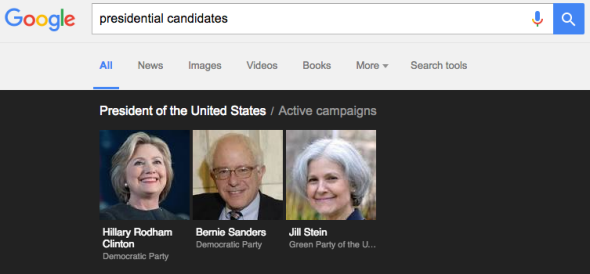Early Wednesday morning, a Columbus, Ohio–based NBC affiliate identified a peculiar quirk in Google’s results. When you plug the term “presidential candidates” into the search engine, an info box of “Active Campaigns” auto-populates at the top of the page. Three (mostly) familiar faces show up in that box: Hillary Rodham Clinton, Bernie Sanders, and Jill Stein. Donald Trump—along with Libertarian candidate Gary Johnson and cult favorite contenders such as Vermin Supreme—was nowhere to found.
Though Donald Trump may not have a real campaign by any ordinary political standard, he clearly deserves to be on that list, as does Johnson, who has performed reasonably well on several recent polls. It’s not immediately clear what’s happening here, but it seems more likely that it’s the result of some glitch in the info box algorithm than of malicious manipulation. While several users on Reddit—a site that has, as Benjy Sarlin has reported, been taken over by Trump supporters—blame these results on bias or institutional censorship, it’s probably not that simple. Among other things, the presence of Sanders—whose campaign is, of course, definitively no longer active, to his supporters’ disappointment—make it more likely that the site is simply pulling its data from bad sources.
The problem is that Google doesn’t tell you where it’s getting its information from—not here at any rate. In the absence of such reference points, it’s hard to figure out where things went wrong. As Mark Graham has shown in Slate, the context for Google’s info boxes about other topics—Graham focuses on cities—is often similarly obtuse. While Google probably doesn’t hide its sourcing in order to deceive users, that ambiguity nevertheless serves its purposes. By presenting information automatically and without clear reference points, the company presents itself as a godlike font of all knowledge, almost Delphic in its capacity for oracular revelation.
Tellingly, even when Google does explain where it’s pulling data from, it still goes wrong sometimes. Indeed, as a group of researchers recently demonstrated in Future Tense, that’s been an issue throughout the campaign. Simply put, Google isn’t great at autonomously explaining candidates’ positions, and its attempts to do so may end up introducing bias into the results it displays, despite its stated desire to do the opposite. A similar fuzziness plays out when Google presents campaign finance statistics, as I’ve written before.
As of 10 a.m. Wednesday, the “Active Campaigns” box was no longer in place. Below the spot it had once been, the NBC affiliate’s report showed up atop a list of related news stories.
Update, July 27, 3:00 p.m.: A Google representative sent the following statement to Slate in response to an earlier request for comment:
We found a technical bug in Search where only the presidential candidates participating in an active primary election were appearing in a Knowledge Graph result. Because the Republican and Libertarian primaries have ended, those candidates did not appear. This bug was resolved early this morning.
The info box is back in place. It now shows Trump, Clinton, Johnson, and Stein.
